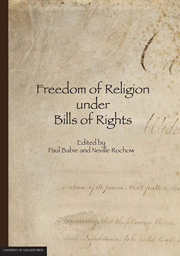Book contents
- Frontmatter
- Contents
- Acknowledgments
- List of Contributors
- Foreword by The Hon Sir Anthony Mason AC KBE: Human Rights and Courts
- INTRODUCTION
- SETTING THE SCENE
- CONTEMPORARY FREEDOM OF RELIGION ISSUES
- 5 Defamation and Vilification: Rights to Reputation, Free Speech and Freedom of Religion at Common Law and under Human Rights Laws
- 6 Should an Australian Bill of Rights Address Emerging International Human Rights Norms? The Challenge of ‘Defamation of Religion’
- 7 Christian Concerns about an Australian Charter of Rights
- 8 Apostasy in Islam and the Freedom of Religion in International Law
- COMPARATIVE EXPERIENCE WITH FREEDOM OF RELIGION
- TABLE OF LEGISLATION AND INTERNATIONAL INSTRUMENTS
- INDEX
7 - Christian Concerns about an Australian Charter of Rights
from CONTEMPORARY FREEDOM OF RELIGION ISSUES
Published online by Cambridge University Press: 05 June 2013
- Frontmatter
- Contents
- Acknowledgments
- List of Contributors
- Foreword by The Hon Sir Anthony Mason AC KBE: Human Rights and Courts
- INTRODUCTION
- SETTING THE SCENE
- CONTEMPORARY FREEDOM OF RELIGION ISSUES
- 5 Defamation and Vilification: Rights to Reputation, Free Speech and Freedom of Religion at Common Law and under Human Rights Laws
- 6 Should an Australian Bill of Rights Address Emerging International Human Rights Norms? The Challenge of ‘Defamation of Religion’
- 7 Christian Concerns about an Australian Charter of Rights
- 8 Apostasy in Islam and the Freedom of Religion in International Law
- COMPARATIVE EXPERIENCE WITH FREEDOM OF RELIGION
- TABLE OF LEGISLATION AND INTERNATIONAL INSTRUMENTS
- INDEX
Summary
At the end of September 2009, the Report of the National Human Rights Consultation was published. As the consultations leading to this report indicated, the issue of whether Australia should have a charter of rights, or some equivalent, is one on which opinions are sharply divided. The extent of the divisions amongst Australians on this issue led the Government to decide not to pursue the path of a human rights Act.
The divisions about a charter of rights were seen in all parts of the community. There was significant opposition, for example, from leading figures in the Labor Party such as former premier of New South Wales, Bob Carr. There is, nonetheless, one quite prominent sector of Australian society in which opposition to a charter has been rather more evident than support for it. That is in the churches. The Australian Christian Lobby, a group with a significant level of support across the country, mostly from evangelical Christians, ran a strong campaign against having a charter. Reservations about a charter are to be found not only in submissions by churches and Christian organizations to the National Human Rights Consultation itself, (‘the NHRC’) but also in submissions to the Australian Human Rights Commission's project on Freedom of Religion and Belief in Australia (‘the AHRC project’).
The spectrum of views among churches
Submissions to the NHRC that are critical of a charter, apart from the Australian Christian Lobby, include those from the Presbyterian Church of Australia, the Baptist Union of Australia, the Anglican Diocese of Sydney, the Life, Marriage and Family Centre of the Catholic Archdiocese of Sydney, and the Ambrose Centre for Religious Liberty (a body that has an advisory council that includes senior figures from a number of different faiths).
- Type
- Chapter
- Information
- Freedom of Religion under Bills of Rights , pp. 117 - 151Publisher: The University of Adelaide PressPrint publication year: 2012



